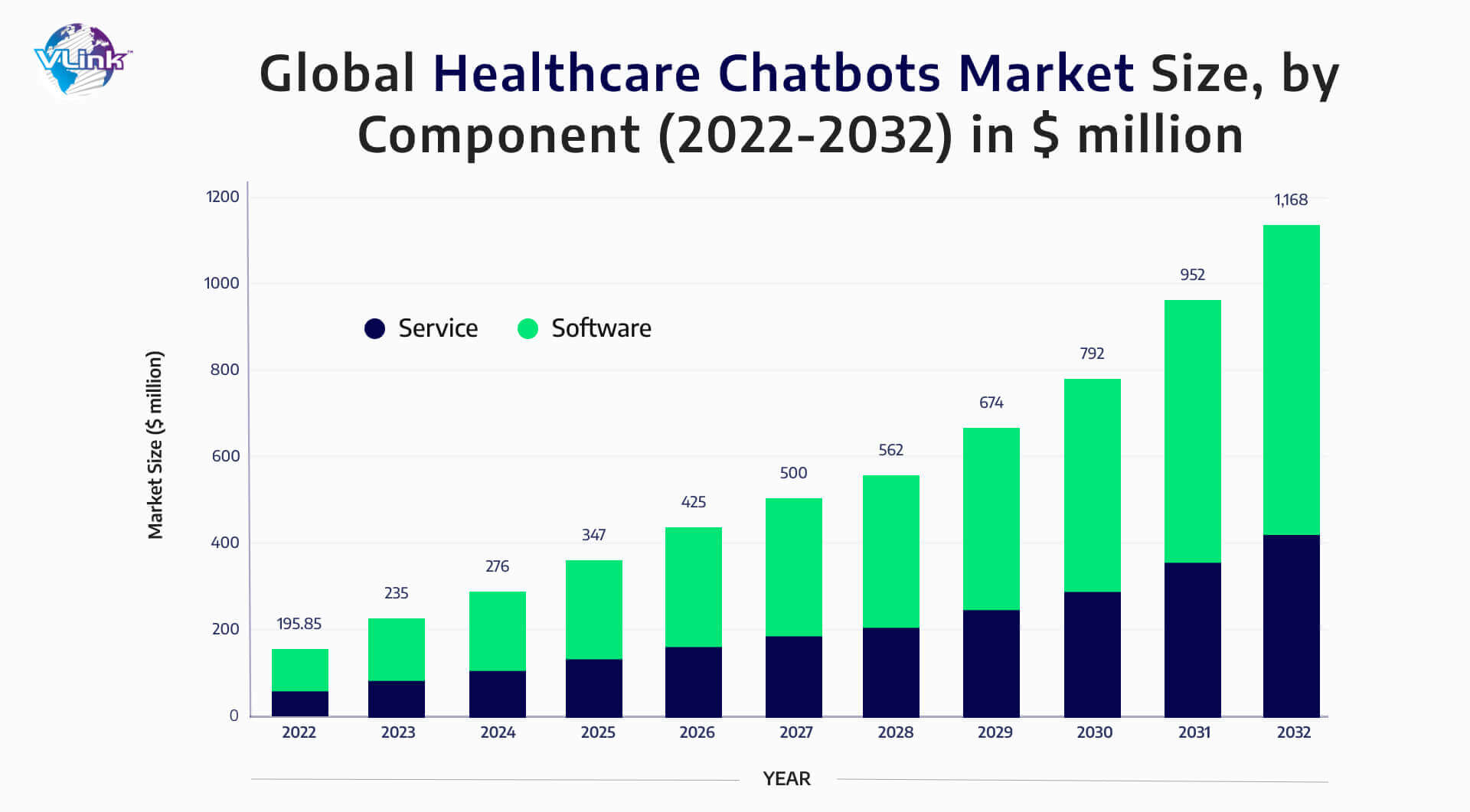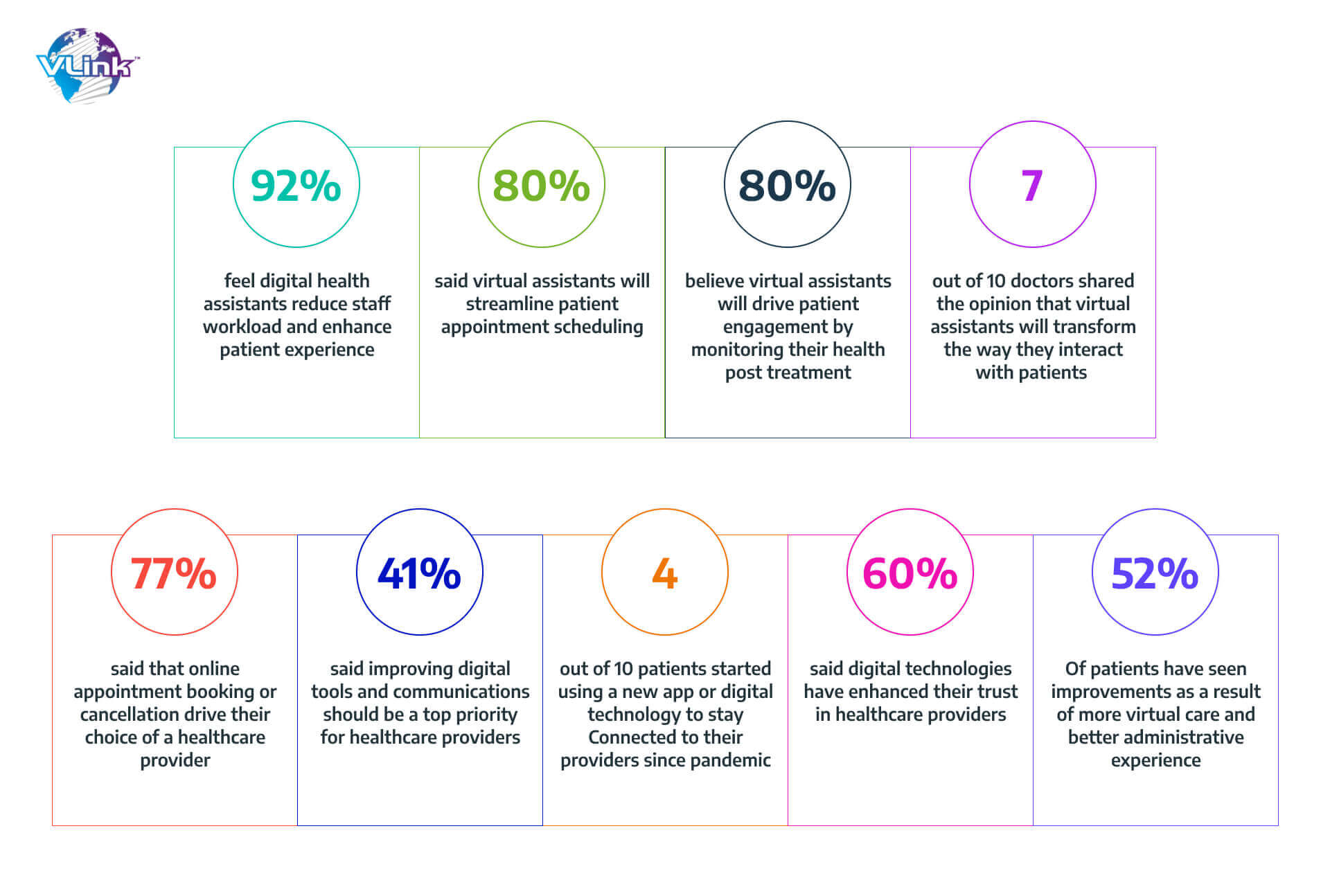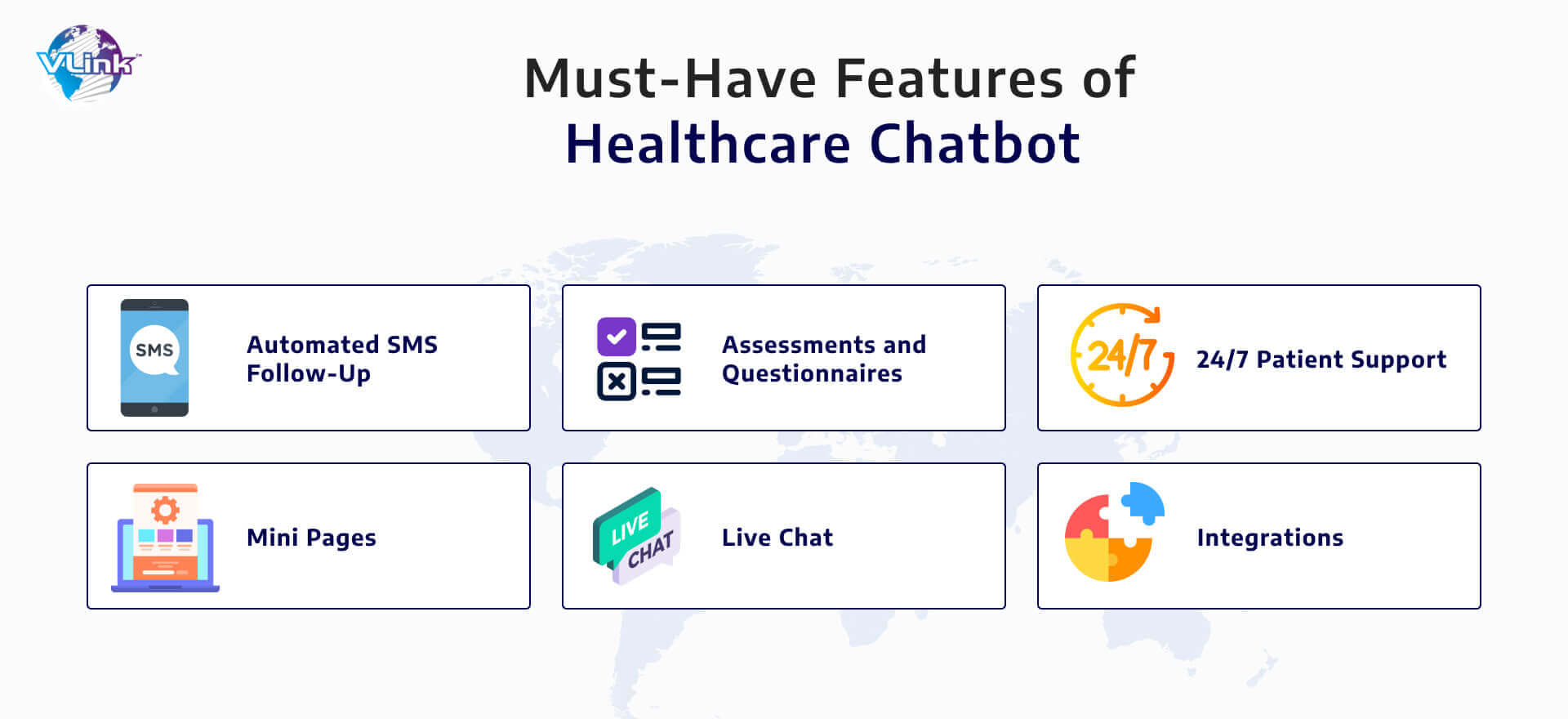Artificial Intelligence undoubtedly is making a significant impact on the healthcare industry as chatbots have recently become popular. From automating routine procedures to creating great customer relationships, the healthcare industry is reaping the benefits of chatbots.
According to a survey of Crunchbase, nearly 14 recognized startups have invested over $800 million in developing health chatbot services. The worldwide healthcare chatbots market is projected to grow by 14.5% CAGR from 2019 to 2026.
The healthcare chatbot market (2022 to 2032) from the valuable resources are shown in the image below:

If you want an effective healthcare chatbot solution for your business, read this blog. Here, we will explore everything you need to know when building a healthcare chatbot.
What is a healthcare chatbot?
Healthcare chatbots provide an advanced virtual customer service experience and are crucial in planning and managing healthcare businesses. A chatbot mimics intelligent conversations with human users.
AI-driven healthcare chatbots can handle straightforward inquiries and offer users a convenient means to access information for their research. In fact, according to Salesforce, 80% of customers prefer obtaining answers from a chatbot instead of completing a website form.
The healthcare industry is no different, as shown in the figure below:

Why Does Your Medical Business Need a Healthcare Chatbot?
In the healthcare industry, chatbots improve customer engagement and overall service efficiency. Here are several reasons why you need a healthcare chatbot.
- Enhanced customer scaling
- Timely medical advice
- Reduced staff expenses
- Improved customer satisfaction
- Process automation
- Improved internal communication
What are the Different Types of Medical Chatbots?
To build an effective chatbot, you should decide what kind of chatbots will meet your target. So, hire experienced developers for the right healthcare chatbot development solution.
Three basic types of chatbots in healthcare;
- Prescriptive,
- Conversational,
- Informative
Must-Have Features of Healthcare Chatbot

How to Build a Healthcare Chatbot: Things You Need to Consider
Here are some essential tips for building a successful healthcare chatbot.
Reduce vulnerability risks
To ensure compliance with HIPAA regulations while developing healthcare chatbots, avoid utilizing third-party texting platforms like Facebook Messenger.
Instead, focus on implementing HIPAA-compliant web development technologies, particularly those provided by AWS (Amazon Web Services). Its secure and compliant infrastructure allows you to maintain the confidentiality and integrity of sensitive patient information throughout the chatbot's operation.
Create secure APIs to establish connections between your HIPAA-compliant chatbot and a fortified server, ensuring protection against potential information leaks. Integrate a robust firewall to shield your healthcare chatbots from web threats effectively.
Additionally, implement standard safeguards like user authorization, 2-step authentication, and end-to-end data encryption to enhance the system's overall security.
Select Between a Rule-based and an AI-driven Chatbot
Selecting the appropriate chatbot technology is paramount for effective customer communication in healthcare. Therefore, it is essential to anticipate factors and make well-informed decisions proactively. To begin, let's explore the distinctions between the two most prevalent types of chatbot technology.
When developing a rule-based communication bot, you create a decision tree that outlines the flow of the conversation. As you build this tool, you must anticipate potential user inquiries and prepare comprehensive responses.
In healthcare, a rule-based chatbot operates within a complex system of predetermined responses, ensuring that users receive all relevant information they seek.
Unlike rule-based tools, AI chatbots in healthcare operate without the constraints of a decision tree.
Instead, they leverage machine learning to grasp the context and provide responses to queries. These chatbots improve their performance over time as they are utilized more frequently in healthcare, allowing for an increasingly efficient generation of answers.
Selecting the appropriate chatbot technology type for a healthcare app does not have a definitive answer. Medical companies often opt for rule-based tools due to their perceived reliability and cost-efficiency, allowing them to avoid unpredictable expenses associated with AI & ML chatbot development services.
Ultimately, the choice hinges on aligning with business requirements and meeting specific customer demands.
Use a suitable conversational style
Whether you are devising phrases for a rule-based tool or configuring initial communication settings for an AI-driven conversation software, ensure that the chatbot's conversational style aligns with the preferences of its users. Craft an appealing opening message that seamlessly initiates communication, making it feel natural and engaging for users.
Incorporate a polite conversational style into your medical chatbot to guarantee courteous client interactions. Emphasize the importance of delivering informative responses to users.
To achieve this, proactively anticipate their questions and equip your healthcare chatbot with relevant, up-to-date data. Your medical chatbot can significantly enhance client satisfaction levels by providing a wealth of information.

Offer a human backup or support system
Even with advanced chatbot technology in healthcare, there may be instances where unpredictable questions necessitate human intervention. Having at least one support agent available to provide chatbot backup in such situations is essential.
Instead of automatically redirecting users when faced with challenging questions, offer them the option to "contact our support agent." However, ensure that this option is available when the healthcare chatbot encounters difficulty in delivering relevant information to clients.
Otherwise, if users can access this option from the outset, it may render the healthcare chatbot less relevant and lead to unnecessary human involvement.
Go for customizability
While numerous ready-made solutions and chatbot generators are available online, implementing platform chatbots in healthcare can restrict your flexibility.
Utilizing conversational software generators may be suitable for creating communication bots with straightforward logic, but more than delivering an exceptional user experience is required.
Opting for custom chatbot development services allows you to build solutions tailored to your client's unique and specific needs, ensuring a more personalized and practical approach.
Use Cases of Chatbots in Healthcare
Here are some use cases & examples of chatbots that describe what advantages they deliver to patients, medical service providers, and doctors:
Health Tracking
Chatbots can be beneficial for patients requiring regular healthcare support. For instance, medical providers can employ bots to facilitate communication between patients and doctors. These bots can provide comprehensive health condition tracking and assist in analyzing the effects of prescribed medications.
Employing and Training
Large healthcare agencies constantly face the challenge of hiring and onboarding new employees, leading to significant paperwork and credential verification. To streamline these processes, connecting chatbots to these facilities can significantly simplify the tasks of HR departments.
For example, new hires can subscribe to the chatbots, seamlessly integrating themselves into the onboarding process and accessing vital information about the organization.
The implementation of chatbots enables companies to send necessary files to new employees when needed, automatically remind them to complete required forms, and automate various other tasks such as handling leave requests for maternity, vacation and more.
Patient Involvement
Chatbots actively engage patients, pique their interest, and encourage them to raise questions, ultimately leading to improved outcomes through increased patient involvement.
Despite some concerns surrounding the use of technology, the right approach can strengthen the bond between patients and healthcare providers rather than weaken it.
Sometimes, doctors ask patients to keep a journal and return after a week. However, in today's tech-savvy world, people are sometimes willing to discuss essential matters before a week.
To address this, providing patients with a convenient, relatable, and enjoyable way to engage with their healthcare can be beneficial. In an on-demand world, patients have high expectations for their healthcare experiences.
Therefore, healthcare providers should embrace the always-on accessibility powered by AI to meet these expectations and enhance patient care.
Research or Treatment
The power of data, particularly in machine learning, offers a significant opportunity to analyze research and information, especially in cancer studies, rapidly. The continuous influx of new research findings makes it challenging for doctors to keep up with every experimental breakthrough.
However, while a doctor may be unable to read and stay updated on all the latest research, an AI-enabled device can do so effectively. Such a device can efficiently search vast amounts of information and provide valuable suggestions to patients and doctors.
This utilization of machine learning represents a remarkable advancement, with the potential for automated support and outreach in data extraction. Ultimately, the aim is to deliver more personalized treatment by establishing a connection between automatically discovering relevant data and having it tailored.
Client Service or Administration
Nowadays, almost every website has integrated a chatbot ready to assist users with website navigation or resolving minor issues. As a result, chatbots will continue to play a vital role in helping users access healthcare services efficiently. In the future, we may see chatbots issuing reminders, scheduling appointments, and facilitating the process of refilling prescription medicines.
However, before such technologies become commonplace, there will be specific challenges to address, particularly concerning HIPAA compliance and ensuring privacy and security. Despite these hurdles, client and administrative service functions powered by chatbots are on the horizon and will likely become more prevalent in the healthcare industry.
How Much Does Healthcare Chatbot Development Cost?
Creating a chatbot from scratch can involve costs ranging from $30,000 to $50,000. Like any custom mobile app development, the final expense depends on the level of sophistication you desire for your chatbot app. For instance, integrating an AI engine with machine learning algorithms will increase the development cost.
Furthermore, considering whether your healthcare chatbot will need integration with existing software applications and systems, such as telemedicine platforms or Electronic Health Records (EHR), is essential.
Experts recommend utilizing ready-made SDKs, APIs, and libraries to manage the budget for chatbot development effectively. This approach helps control the app development cost and significantly accelerates the time-to-market.
Build a Healthcare Chatbot for your Business with VLink!
VLink specializes in delivering advanced chatbot solutions tailored to the healthcare sector, enhancing how patients engage with doctors and healthcare organizations. By leveraging our chatbot technology, patients can now receive rapid responses to their health-related inquiries, enabling them to take prompt action, particularly during critical conditions.
Our healthcare-oriented chatbot streamlines interactions on both ends, empowering it to execute various tasks on behalf of the patients, resulting in a more seamless and efficient patient care experience.
The Final Thought!
Now that you have a deeper understanding of healthcare chatbots and their importance, it's the perfect time to harness the potential of these communication technologies. However, developing chatbots requires a considerable amount of technical expertise.
If you need more clarification about your technological capabilities, you should seek assistance from a software development company like VLink, which specializes in chatbot development services. Our expertise will ensure the successful implementation of chatbots to enhance healthcare communication.
Frequently Asked Questions
AI chatbots in healthcare are computer programs that use artificial Intelligence to interact with users and provide healthcare-related information, support, and assistance. They can help with medical queries, appointment scheduling, medication reminders, mental health support, enhancing patient engagement and accessibility to healthcare services.
The future of chatbots in healthcare holds great potential for enhanced patient care. They may become more advanced, incorporating natural language processing, sentiment analysis, and personalized recommendations. It'll lead to improved patient engagement, remote monitoring, and better access to healthcare resources.
Key risks and challenges of chatbots in healthcare include:
- Privacy and security concerns regarding sensitive patient data
- Accuracy and reliability issues in providing medical advice or diagnosis
- Lack of empathy and emotional understanding in interactions with patients
- Regulatory compliance to ensure adherence to healthcare laws and standards
- Misconception of user queries can lead to incorrect responses
- Limited ability to handle complex medical scenarios requiring human intervention
Some top healthcare chatbots were Ada Health, Buoy Health, and Your.MD, Florence, and Woebot.







